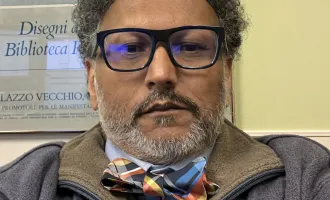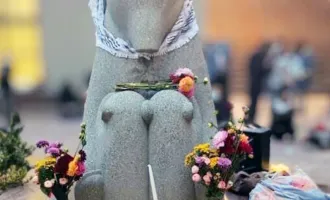
This Date in UCSF History: Students Granted Political Asylum
First published in synapse on October 22, 1989.
Two Chinese dissident students, Hoy Yu Vi, 27, and Luo Jian Guang, 32, have been granted political asylum here because their involvement in the pro-democracy movement puts them in jeopardy should they return home.
Immigration Judge Bernard Hornbach ruled Oct. 6 that Hoy and Luo “have a well-founded fear of persecution should they be returned to Communist China by reason of political opinion.”
The decision — which could affect the fate of Chinese students studying in the United States and elsewhere — was hailed at a press conference called by the students’ attorney, Eugene C. Wong of San Francisco.
“It is based on the fact that they are members of a social group, the pro-democracy movement [that is likely to be persecuted if they return to China],” Wong said, “and that their own individual political opinions are sufficient for them to gain asylum, because of the likelihood of persecution.”
With Wong as their translator, Hoy and Luo explained that they were pursuing graduate studies in Japan — Hoy in linguistics and Luo in international business— at the time of the June 4 massacre in Tiananmen Square.
The couple helped organize and publicize pro-democracy rallies in Japan and submitted a petition with their names on it to the Chinese embassy.
Pictures of them participating in a rally protesting the massacre were taken by embassy officials, and photographs of the couple appeared in Japanese newspapers.
They were thus clearly identified as members of the pro-democracy movement. After the rally, according to Luo, both he and Hoy received several anonymous, threatening phone calls telling them “not to forget that we are still Chinese” and warning them that they would eventually have to return to China and face the consequences of their actions.
When the Chinese government began publicly denouncing, “re-educating” and executing leaders of the pro-democracy movement shortly after the June 4 crackdown. Hoy and Luo felt that they would be in danger if they returned home.
Although their student visas had not yet expired in Japan, the Japanese immigration laws were too restrictive, and the Japanese authorities were refusing to even accept applications for asylum from students.
The couple decided to go to the United States, even though neither spoke much English, because “the United States is the leader in freedom and democracy,” said Luo. He admitted that they knew very little about the United States before they arrived, but Hoy said they watched the CBS News every night at midnight while in Tokyo.
Hoy and Luo left Japan and arrived in San Francisco on Aug. 7, bearing Argentinean passports they had obtained through intermediaries. They were charged with being “excludable and deportable pursuant to Sections 212(a)(19) and (20) of the Immigration and Nationality Act because of fraud and no valid visa or other entry document.”
The two were separated and placed in jail cells in the Oakland Detention Center. Hoy, who complained of stomach ulcers, was released on $5,000 bond on Sept. 26; Luo was released on Oct. 4, also on $5,000 bond.
Among the witnesses for Hoy and Luo was Huang Sheng-Yu, a post-doctoral student at UC Berkeley, who testified that members of the student movement have indeed been receiving threatening phone calls.
San Francisco State professor George Lee, called as an expert witness, asserted that the leadership in China is particularly fearful of students because they have the “knowledge and understanding to be able to point out that the communist system in that country is no longer viable.”
Lee testified that dissidents returning to China would likely be arrested, tortured, and placed in labor camps for sentences up to life, and that “a sentence of death for what is viewed as counter-revolutionary and traitorous conduct could not be ruled out.”
Under the 1980 Refugee Act, applicants for asylum must “demonstrate a well-founded fear of persecution on account of race, religion, nationality, membership in a particular group or political opinion.”
Hornbach said that the students were members of a “particular social group because of their shared belief with other members in freedom and democracy. As such, they constitute a relatively small, easily identified group... which would subject them to persecution as it did those in Tiananmen Square.”
In his written decision, the Immigration Judge noted “The satellite photos of the bloodbath on June 3rd and 4th in Tiananmen Square in which hundreds and perhaps thousandsof students, small children and elderly people were slaughtered is sufficient evidence in and of itself to satisfy the requirements of the law insofar as the Applicants’ right to asylum. We now know how Communist China deals with peaceful demonstrators who are seeking to liberalize the communist system... Until China changes its policy of death, fear and terror against dissidents, foreign students involved in the democratization movement should not be forcibly returned to Red China by the Government of the United S tales. Neither necessity nor the threat which the leaders of China stated they pose justified the slaughter of the students.”
At the Oct. 6 press conference, camerapcrsons and reporters crowded the lawyer’s office, coaxing a few words of halting English from the students. Luo said he understood the handcuffs and jail sentence upon arrival in the U. S. were “part of the law,” and had no regrets about coming here.
“For the first time in my life,” he said, “I am breathing the air of freedom.” Asked after the press conference about her feelings toward China, Hoy said in English “I hate the Chinese government. There is no freedom there.”
Boy meets girl
Much of the questioning dealt with the “human interest” side of the story. Hoy and Luo held hands tightly while telling the world that they would be married soon, planned to study English and will stay with Hoy’s relatives in San Francisco.
Asked how they had met and why they liked each other, Luo replied that they had met while studying in Japan two years ago, and shyly added, “she is good to me, and I’m good to her.” The couple have something else in common besides their overseas studies: both had fathers who were imprisoned during the cultural revolution, one for being labelled a capitalist, and the other for being a poet.
The case has important ramifications for the more than 40,000 Chinese students currently in the United States. By the ruling that the pro-democracy movement is a social group likely to be persecuted, overseas Chinese students who can be identified as having participated in the movement can apply for political asylum under the 1980 Refugee Act.
Wong, who has handled cases from various countries for asylum, said he does not expect a flood of applications, and points out that graduate students may instead apply for professional green cards through their employers.
He cautions that each case will be tried on its merits, and that this ruling applies only to members of the Chinese pro-democ-racy movement. Applicants from other countries (such as El Salvador) who allege political persecution must prove membership in an easily identifiable social group that has been singled out for persecution by the government.
Concern on Campus
At UCSF, the reaction of Jian Zuo, a Chinese graduate student in physiology, was positive but guarded. Jian Zuo, who had written an article (Synapse, May 25,1989) about the pro-democracy movement, said he feels that the granting of asylum to Hoy and Luo is “good news for all Chinese students.”
He agrees that dissident students would definitely face persecution if they return toChina, especially the most visible students who have appeared on television or have had their names in print. He believes that most Chinese students seek “protection, not asylum,” and urges support of a bill sponsored by Congresswoman Nancy Pelosi to protect the Chinese students currently in the United States.
The current Presidential Order, explains Jian Zuo, grants only one year of protection before students have to return to China. He says this “doesn’t make any sense to any of us,” as he does not expect the attitudes of the Chinese government to change significantly in one year’s time.



